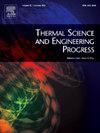Performance improvement of photovoltaic/thermal system using microencapsulated phase-change material suspension
IF 5.4
3区 工程技术
Q2 ENERGY & FUELS
引用次数: 0
Abstract
Featuring a radiative cooling (RC) film coated on the top cover glass and a microencapsulated phase-change material suspension (MEPCS) as the coolant, a novel photovoltaic/thermal (PV/T) system was proposed in this work for enhanced electrical performance and simultaneous thermal output. A rigorous numerical model was established for the PV/T system, the physical properties of MEPCS were systematically characterized, and the performance of a stand-alone PV panel and the PV/T system was compared numerically. The parametric analysis revealed that the inlet temperature of the coolant was the most critical operating parameter affecting the system performance. Specifically, under the meteorological conditions of July in Nanjing, the total electrical generation of the PV panel, water-based PV/T system, and MEPCS-based PV/T system were 18.18 kWh/m2, 18.86 kWh/m2, and 18.99 kWh/m2, while the total thermal generation of the water- and MEPCS-based PV/T systems were 312.21 MJ/m2 and 347.26 MJ/m2, respectively. The MEPCS-based PV/T system was a more advantageous solution for solar applications, especially for the tropics with abundant solar resources.
微封装相变材料悬浮液改善光伏/热系统性能
采用覆盖在顶盖玻璃上的辐射冷却(RC)膜和微封装相变材料悬浮液(MEPCS)作为冷却剂,提出了一种新型的光伏/热(PV/T)系统,以提高电性能和同步热输出。建立了严格的PV/T系统数值模型,系统表征了MEPCS的物理性能,并对独立光伏板和PV/T系统的性能进行了数值比较。参数分析表明,冷却液入口温度是影响系统性能的最关键运行参数。其中,南京7月气象条件下,光伏板、水基PV/T系统和mepc基PV/T系统的总发电量分别为18.18 kWh/m2、18.86 kWh/m2和18.99 kWh/m2,水基PV/T系统的总发电量分别为312.21 MJ/m2和347.26 MJ/m2。基于mepc的PV/T系统是太阳能应用的一个更有利的解决方案,特别是在太阳能资源丰富的热带地区。
本文章由计算机程序翻译,如有差异,请以英文原文为准。
求助全文
约1分钟内获得全文
求助全文
来源期刊

Thermal Science and Engineering Progress
Chemical Engineering-Fluid Flow and Transfer Processes
CiteScore
7.20
自引率
10.40%
发文量
327
审稿时长
41 days
期刊介绍:
Thermal Science and Engineering Progress (TSEP) publishes original, high-quality research articles that span activities ranging from fundamental scientific research and discussion of the more controversial thermodynamic theories, to developments in thermal engineering that are in many instances examples of the way scientists and engineers are addressing the challenges facing a growing population – smart cities and global warming – maximising thermodynamic efficiencies and minimising all heat losses. It is intended that these will be of current relevance and interest to industry, academia and other practitioners. It is evident that many specialised journals in thermal and, to some extent, in fluid disciplines tend to focus on topics that can be classified as fundamental in nature, or are ‘applied’ and near-market. Thermal Science and Engineering Progress will bridge the gap between these two areas, allowing authors to make an easy choice, should they or a journal editor feel that their papers are ‘out of scope’ when considering other journals. The range of topics covered by Thermal Science and Engineering Progress addresses the rapid rate of development being made in thermal transfer processes as they affect traditional fields, and important growth in the topical research areas of aerospace, thermal biological and medical systems, electronics and nano-technologies, renewable energy systems, food production (including agriculture), and the need to minimise man-made thermal impacts on climate change. Review articles on appropriate topics for TSEP are encouraged, although until TSEP is fully established, these will be limited in number. Before submitting such articles, please contact one of the Editors, or a member of the Editorial Advisory Board with an outline of your proposal and your expertise in the area of your review.
 求助内容:
求助内容: 应助结果提醒方式:
应助结果提醒方式:


